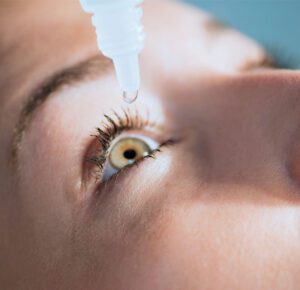 Eye allergies develop when the eyes produce extra histamines to fight off an irritant, resulting in red, swollen, watery eyes that can burn, itch, and produce clear discharge. However, each individual’s reaction level is different depending on how sensitive they are to each allergen. Here are some common causes of eye allergies and ways you can treat them.
Eye allergies develop when the eyes produce extra histamines to fight off an irritant, resulting in red, swollen, watery eyes that can burn, itch, and produce clear discharge. However, each individual’s reaction level is different depending on how sensitive they are to each allergen. Here are some common causes of eye allergies and ways you can treat them.
CAUSES OF EYE ALLERGIES
Eye allergy symptoms can be triggered both indoors and out. Some of the most common causes of eye allergies, include:
. Outdoor Allergens: Pollen from grass, trees and weeds is the largest cause of outdoor eye allergies. Allergic symptoms are often worse in the spring, when many trees and flowers are in bloom.
. Indoor Allergens: The most common cause of eye allergies found indoors is pet dander, which is dead skin cells shed by cats, dogs or other domestic animals. Dust mites and mold are other common indoor allergens that can irritate the eyes.
. Irritants: Cigarette smoke, perfume, diesel exhaust, odorous foods and expired cosmetics can cause your eyes to have an allergic response. You can also experience eye irritation as a side effect from elements that don’t come in direct contact with your eyes, such as insect bites.
HOW TO AVOID EYE ALLERGENS
The best way to treat eye allergies is by taking precautionary measures to avoid common eye irritants. Easy steps to take include:
. Keeping windows closed during pollen season
. Regularly changing your air conditioning filter to remove irritants in the air
. Wearing eye protection outside to help keep pollen out of your eyes
. Running a dehumidifier indoors to keep humidity low and reduce the risk of mold
. Regularly vacuuming and sweeping floors and surfaces for pet hair, dust, and pollen
. Using a damp mop or rag to trap dust when cleaning
. Investing in allergen-reducing sheets and pillowcases
. Regularly wash bedding in hot water
. Washing your hands after petting animals
DIAGNOSING EYE ALLERGIES
Getting a diagnosis for your eye allergies is a relatively simple process. During a routine eye exam, your ophthalmologist will closely examine your eyes to look for swollen blood vessels, swelling of the conjunctiva or eyelid, or bumps on your eye’s inner lining. Some allergies can be hereditary, so your eye doctor will also ask about your family’s medical history.
WAYS TO TREAT EYE ALLERGIES
If you’re experiencing eye allergy symptoms, the following over-the-counter medications can provide temporary relief:
. Artificial tears: Artificial tears temporarily wash away eye allergens and relieve dry eyes by providing extra moisture.
. Decongesting eyedrops: Decongestants reduce redness and include histamines that can relieve itchiness. However, decongestants should not be used for more than a week, as they can increase symptoms if overused.
. Oral antihistamines: While this solution helps relieve itching, it can also dry out your eyes.
For severe eye allergy symptoms, it is best to consult with your ophthalmologist or optometrist directly, as they’ll be able to prescribe you a stronger and longer-lasting eye allergy treatment. Prescriptive options include:
. Eyedrops: Advanced eyedrops contain both antihistamines (which reduce itching and redness) and mast cell stabilizers (which prevent the release of histamines if used before exposure). Corticosteroid eyedrops are the strongest solution to treat chronic and severe symptoms.
. Immunotherapy shots or drops: To improve your tolerance to eye allergens, immunotherapy exposes you to small amounts of an allergen in gradually increasing doses over time. This solution can take several months to see effective results.
. Nonsedating oral antihistamines: These prescription-level antihistamines lack the sedating side effects of many over-the-counter medicines. However, you may still experience dry eyes and a temporary increase in symptoms.
Ultimately, it may take a combination of lifestyle changes, over-the-counter and prescription treatments to start seeing serious, long-term eye allergy relief. To fully address and reduce eye allergies, visit the experts at Lake Eye to diagnose your problem and prescribe a treatment that’s right for you.
KEEP YOUR EYES CLEAR AND HEALTHY AT LAKE EYE
Lake Eye, a US Eye company, is dedicated to preserving and restoring your vision. From comprehensive eye exams and a full-service optical department to advanced treatments for nearly every eye condition, including eye allergies, we provide a variety of services to help you keep your eyes clear and healthy. To learn more, contact us today and schedule an appointment with one of our experienced ophthalmologists or optometrists.
Lake Eye Associates
352-632-2020
 Central Florida Health and Wellness Magazine Health and Wellness Articles of the Villages
Central Florida Health and Wellness Magazine Health and Wellness Articles of the Villages



